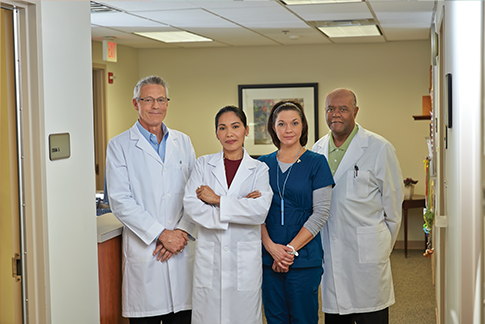Where to Find Ostomy Support
After your surgery, you first have to learn how to deal with the physical challenges of living with an ostomy: caring for your stoma and managing your ostomy pouching system. After that, however, you may find yourself struggling with the emotional challenges.
You might feel reluctant to accept social invitations or attend events, because you’re afraid something will go wrong with your pouching system. You might feel embarrassed to tell friends and family about your ostomy. You might feel anxious about someone seeing your ostomy pouch, or about ostomy odors.
Take heart! You’re not the only person struggling with these feelings: There are millions of others who have gone through it too. It’s natural to miss your pre-ostomy self, although you may discover that you have more freedom, not less, once you’re accustomed to your ostomy system. The best way to move forward is to seek out the support you need.
Chat With an Ostomy Visitor
An ostomy visitor is someone who lives with a colostomy, ileostomy or urostomy and volunteers to mentor new ostomates. You may meet one in the hospital after your surgery, or you can request one through a local support group.


Reach Out to Your WOC Nurse
Your wound, ostomy and continence (WOC) nurse is a vital source of knowledge and encouragement. Not only are they experts in treating complex wounds and ostomy issues, but they have empathy and understanding for people who are new to living with an ostomy. The hospital where you had your surgery can connect you with a WOC nurse, or you can find one in the Wound, Ostomy and Continence Nurses Society directory.
Join an Ostomy Support Group
Local ostomy support groups are some of the best ostomy resources you’ll find. These friendly groups meet on a regular basis to share tips with each other and advise people who are new to ostomy. Their meetings may feature expert speakers, such as surgeons, WOC nurses, and representatives of ostomy supply distributors, who bring products and free samples to try. Use the United Ostomy Associations of America (UOAA)’s Support Group Finder to locate one in your area.
If there’s nothing near you, or if you just don’t like in-person events, consider joining a virtual support group instead. Some of these groups are specialized, such as the Pediatric Ostomy Support Group for young people who have, or are preparing to have, an ostomy.


Participate in Online Ostomy Communities
In just a few minutes online, you can find a hundred examples of ostomates connecting and having conversations about their experiences. All you have to do is find the right group for you.
If Facebook is your preferred social media channel, search for ostomy discussion and support groups. On Instagram and TikTok, #ostomy brings up thousands of people sharing photos, videos and stories about their lives. You’ll find ostomy fitness and lifestyle inspiration, ostomy Q&As and plenty of ostomy humor. There are traditional discussion forums, chat rooms and dating sites.
Talk to a Mental Health Professional
If you experience persistent feelings of loneliness, hopelessness, sadness, inertia, anger or depression, you should reach out to a therapist or psychiatrist. Not sure how to find the right person? Your WOC nurse or hospital social worker can guide you.

Related Products

